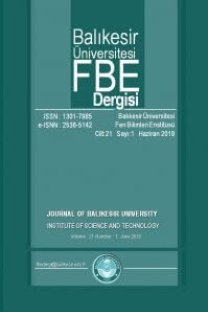Ters sarkacın uyarlamalı kazançlı bağımsız yüzeyli kayan kip yöntemi ile denetimi
Bu çalışmada gerçek bir ters sarkaç sistemi için yeni bir uyarlamalı kazançlı, bağımsız yüzeyli kayan kip denetim tekniği (UKKKD) önerilmektedir. Böylece modellenemeyen ve üst sınır değerleri belirli olmayan bozucu etkilere karşı dayanıklı bir denetim yapısı elde edilmektedir. Önerilen denetim yöntemi ile dayanıklılık özelliği en küçük kazanç değerlerinde dahi korunmakta ve böylece kayan kip denetimin temel problemi olan çatırtı etkisi de azaltılmaktadır. Çalışmada, ters sarkaç ve denetim sisteminin MATLAB/SIMULINK benzetim ile uygulama grafikleri karşılaştırmalı olarak verilmiş ve denetimin olumlu etkisi doğrulanmıştır.624432
Adaptive gain decoupled sliding mode control of inverted pendulum
In this study, a new adaptive gain, decoupled surface sliding mode control technique is proposed for a real inverted pendulum system. Thus a robust control structure against unmodeled and uncertain upper limit valued disturbances is developed. With the proposed control method, the robustness property is preserved even at the smallest gain values and thus the chattering effect, which is the main problem of the sliding mode control, is reduced. In this study, MATLAB / SIMULINK simulations and experimental results of the inverted pendulum control system are compared and the positive effect of the proposed control method is confirmed.
Keywords:
Inverted pendulum sliding mode, adaptive gain, robust control,
___
- [1] Mahapatra, C., Chauhan, S. ve Hemakumar, B., Servo control and stabilization of linear ınverted pendulum on a cart using LQG, 2018 International Conference on Power Energy, Environment and Intelligent Control (PEEIC), 783-788, India, (2018).
- [2] Mobara, M., Karimpour, A., Ahamadian, H. M. ve Pahnabi, A., Modeling control of inverted pendulum based on PWA-fuzzy approach, Second International Congress on Technology, Communication and Knowledge(ICTK 2015),112-116, Iran, (2015).
- [3] Brill, A., Frank, J. A. ve Kapila V., Visual servoing of an inverted pendulum on cart using a mounted smartphone, American Control Conference (ACC),1323- 1328, Boston, (2016).
- [4] Bakarac, P., Klauco, M. ve Fikar, M., Comparison of inverted pendulum stabilization with PID, LQ, and MPC control, Proceeding of the 29th International Conference 2018 Cybernetics&Informatics (K&I), 1-6, Slovakia, (2018).
- [5] Nath, K. ve Dewan, L., Control of rotary inverted pendulum via adaptive techniques, International Conference on Emerging Trends in Computing and Communication Technologies (ICETCCT),1-6, India, (2017).
- [6] Mahaaptra, C. ve Chauhan, S., Tracking control of inverted pendulum on a cart with disturbance using pole placement and LQR, International Conference on Emerging Trends in Computing and Communication Technologies (ICETCCT), 1-6, India, 2017.
- [7] Sarkar, T. T. ve Dewan, L., Application of LQR and MRAC for swing up Control of inverted Pendulum, 4th International Conference on Power, Control & Embedded Systems (ICPCES), 1-6, India, (2017).
- [8] Gautam, P., Optimal control of inverted pendulum system using ADALINE artificial neural network with LQR, IEEE International Conference on Recent Advances and Innovations in Engineering (ICRAIE), 1-6, Jaipur, (2016).
- [9] Wang, J. ve Kumbasar, T., Big Bang-Big Crunch optimized hierarchical slidingmode control of X-Z inverted pendulum, Simulation Modelling Practice and Theory, 86, 25–35, (2018).
- [10] Wanga, Y., Xia, Y., Li, H. ve Zhou, P., A new integral sliding mode design method for nonlinear stochastic systems, Automatica, 90, 304–309, (2018).
- [11] Khan, Q., Akmeliawati, R., Bhatti, A. I. ve Khan, M. A., Robust stabilization of under actuated nonlinear systems: A fast terminal sliding mode approach, ISA Transactions, 66, 241–248, (2017).
- [12] Li, P., Yu, X. ve Xiao, B., Adaptive quasi-optimal higher order sliding-mode control without gain overestimation, IEEE Transactions On Industrial Informatics, 14, 9, 3881-3891, (2018).
- [13] Baek, S., Baek J. ve Han, S., An adaptive sliding mode control with effective switching gain tuning near the sliding surface, IEEE Access, 7, 155563-15572, (2019).
- [14] Shi, S., Li, J. ve Fang, Y., Extended-state-observer-based chattering free sliding mode control for nonlinear systems with mismatched disturbance, IEEE Access, 6, 22952-22957, (2018).
- [15] Repecho, V., Biel, D., Lara R. R. ve Vega, P. G.,Fixed-switching frequency interleaved sliding mode eight-phase synchronous buck converter, IEEE Transactions On Power Electronics, 33, 1, 666-688, (2018).
- [16] Guo, Y., Ma, B., Chen, L. ve Wu, R., Adaptive sliding mode control for a class of Caputo type fractional-order interval systems with perturbation, IET Control Theory & Applications, 11, 1, 57-65, (2017).
- [17] Van, M., Ge, S. S., ve Ren H., Robust fault-tolerant control for a class of second-order nonlinear systems using an adaptive third-order sliding mode control, IEEE Transactions On Systems, Man, And Cybernetics: Systems, 47, 2, 221-228, (2017).
- [18] Baek, J., Jin, M., ve Han S., A new adaptive sliding-mode control scheme for application to robot manipulators, IEEE Transactions On Industrial Electronics, 63, 6, 3628-3637, (2016).
- [19] Tiga, A., Ghorbel, B. ve Braiek, B., Performance comparison of backstepping and sliding mode controllers, International Conference on Advanced Systems and Electric Technologies (IC_ASET), 461-466, Tunusia, (2018).
- [20] Muhammad, S. ve Idrees, M., Comparative study of hierarchical sliding mode control and decoupled sliding mode control, IEEE Conference on Industrial Electronics and Applications (ICIEA), 818-823, Cambodia, (2017).
- [21] Utkin, V. I., Variable Structure systems with Sliding Modes. IEEE Transaction on Automatic Control, 22, 2, 212-222, (1977).
- [22] Utkin, V. I. ve Poznyak, A. S., Adaptive sliding mode control with application to super-twist algorithm: Equivalent control method, Automatica, 49, 39–47, (2013).
- [23] Plestan, F., Shtessel, Y., Bregeault, V. ve Poznyak, A., Sliding mode control with gain adaptation-Application to an electropneumatic actuator, Control Engineering Practice, 21, 679–688, (2013).
- ISSN: 1301-7985
- Yayın Aralığı: Yılda 2 Sayı
- Başlangıç: 1999
- Yayıncı: Balıkesir Üniversitesi
Sayıdaki Diğer Makaleler
Metil paration bileşiğinin paraoksonaz enzimi üzerine inhibisyon etkisinin araştırılması
Mustafa Umut KONANÇ, Mustafa Kema GÜMÜŞ
Bazalt tozu katkılı harçların mekanik ve geçirimlilik özeliklerinin araştırılması
Veysel AKYÜNCÜ, Mehmet Timur CİHAN
Üç yüzlü grafların doğru graflarının omega invaryantı
Üç hücreli motif genelleme ile oluşturulan küçük ölçekli biyolojik sinir ağlarının bellek davranışı
Ahmet TURAN, Temel KAYIKÇIOĞLU
Polivinil alkol/CuO nanokompozit hidrojeller: kolay sentezi ve uzun-süreli kararlılığı
